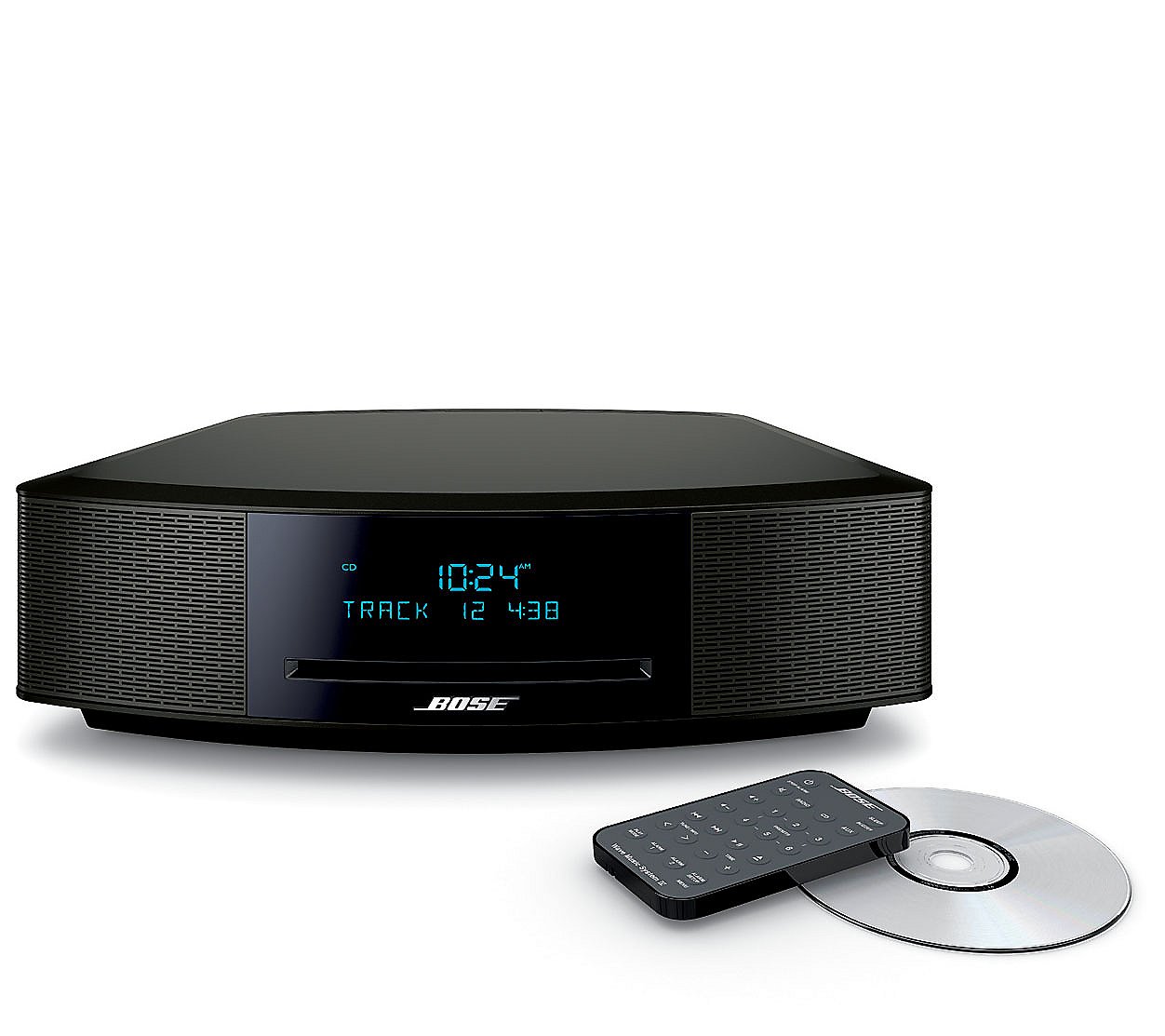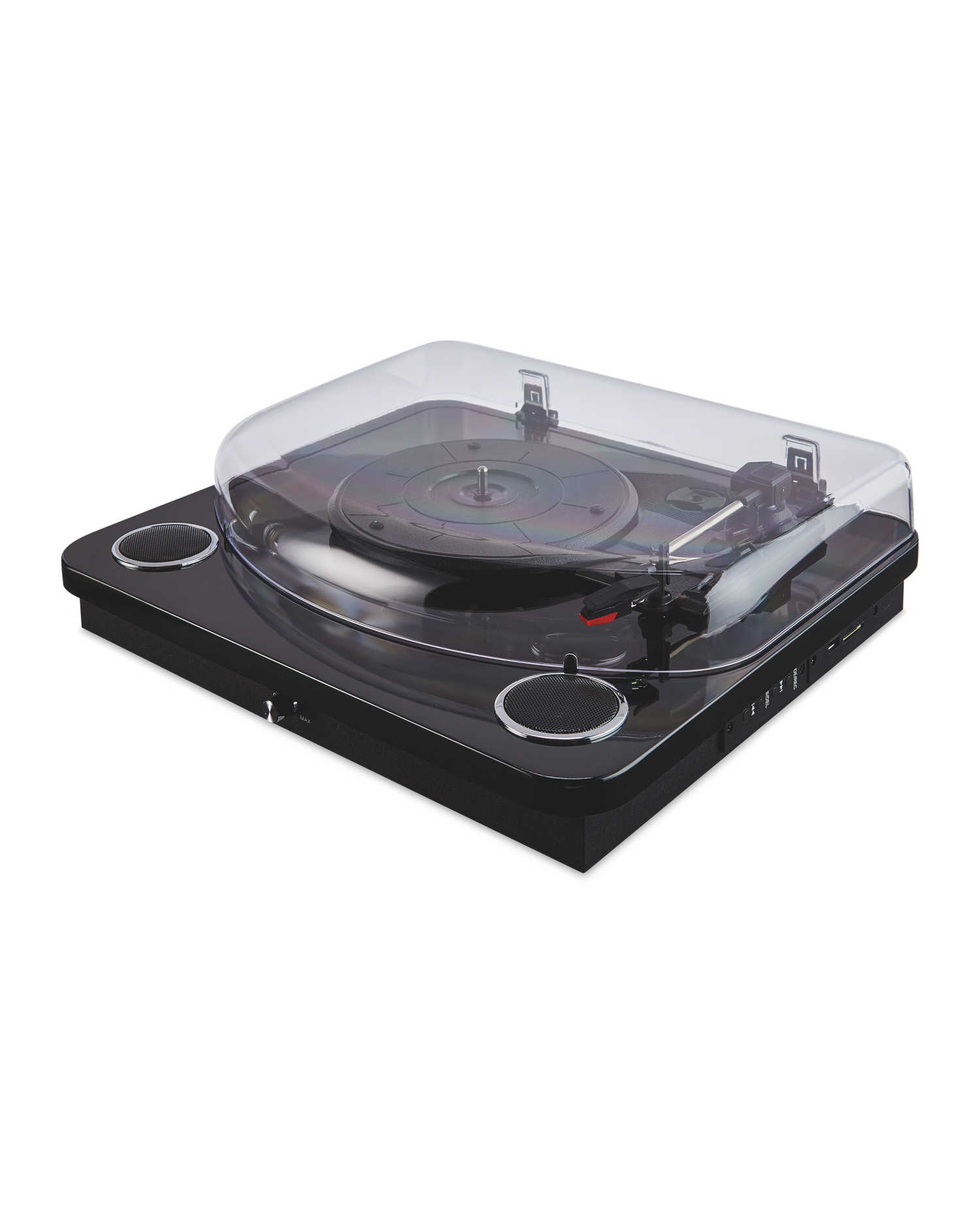Bose Wave Music System IV with CD Player and Alarm Clock
-
( 8 Reviews )Rated 5.00 out of 5 based on 8 customer ratings08
Lifelike, room-filling sound with breakthrough waveguide technology. Fresh, updated design. CD/MP3 CD player; advanced AM/FM tuner; text display of song information. Dual alarms, touch-top on/off/snooze, slim remote with 12 presets. Wireless network compatibility: 802.11 b/g/n.
-
SAMSUNG Galaxy Buds+, Cosmic Black (Charging Case Included)
Rated 5.00 out of 505SAMSUNG Galaxy Buds+, Cosmic Black (Charging Case Included)
Rated 5.00 out of 505 -
Maginon USB Turntable With Speakers – 712634468622800
Rated 4.80 out of 505Maginon USB Turntable With Speakers – 712634468622800
Rated 4.80 out of 505 -
Kenwood – DRV-N520 Dash Cam – Black
Rated 5.00 out of 505Kenwood – DRV-N520 Dash Cam – Black
Rated 5.00 out of 505
Your Wave, your way. The Bose Wave Music System IV delivers big, bold Bose sound from one compact device. In addition to being a reliable clock offering dual, independent, customizable alarms — it plays the tunes you love in the way you prefer them played.
From Jingle Bell Rock to Crocodile Rock and everything in between. The Bose Wave Music System IV makes for a wonderful holiday gift that will play on an everyday basis.
Waveguide speaker technology fills the room with crisp, clear audio, all from a frame that fits just about anywhere.
With a CD player, AM/FM radio tuner, and an auxiliary port for your phone or tablet, it offers up a bevy of ways to play. Now sit back and let the Wave wash over you. From Bose.
- Includes Bose® Wave® Music System IV with 8’L AC power cord, and remote control
- Waveguide speaker technology
- Digital display with adjustable brightness, automatic dimming
- Integrated touch-top controls
- Slot-loading CD player: plays CD, MP3 CD, and CD-R/RW; repeat, random, and continuous play modes
- AM/FM radio tuner: six FM and six AM presets; displays artist/song information
- Dual independent alarms with rising volume
- Bose link
- Auxiliary input
- Headphone jack
- Measures approximately 14-5/8″W x 4-1/4″H x 8-5/8″D, weighs 8.7 lbs
- UL listed; 1-year Limited Manufacturer’s Warranty
- Imported
Additional information
| Product Dimensions | 6.97 x 12.75 x 19.02 inches |
|---|---|
| Item Weight | 1 pounds |
| Manufacturer | Bose Corporation |
| Item model number | 737251-1710 |
Bose may refer to:
- Bose (crater), a lunar crater.
- Bose (film), a 2004 Indian Tamil film starring Srikanth and Sneha
- Bose (surname), a surname (and list of people with the name)
- Bose (given name), a given name
- Bose, Italy, a frazione in Magnano, Province of Biella
- Bose Monastic Community, a monastic community in the village
- Bose, Poland
- Bose Corporation, an audio company
- Bose Ogulu, Nigerian manager of Burna Boy
- Baise, or Bose, a prefecture-level city in Guangxi, China
- Bose: The Forgotten Hero, a 2004 Indian film about Subhas Chandra Bose
- Bose: Dead/Alive, a web series about Subhas Chandra Bose
A clock or chronometer is a device that measures and displays time. The clock is one of the oldest human inventions, meeting the need to measure intervals of time shorter than the natural units such as the day, the lunar month, and the year. Devices operating on several physical processes have been used over the millennia.
Some predecessors to the modern clock may be considered "clocks" that are based on movement in nature: A sundial shows the time by displaying the position of a shadow on a flat surface. There is a range of duration timers, a well-known example being the hourglass. Water clocks, along with sundials, are possibly the oldest time-measuring instruments. A major advance occurred with the invention of the verge escapement, which made possible the first mechanical clocks around 1300 in Europe, which kept time with oscillating timekeepers like balance wheels.
Traditionally, in horology (the study of timekeeping), the term clock was used for a striking clock, while a clock that did not strike the hours audibly was called a timepiece. This distinction is not generally made any longer. Watches and other timepieces that can be carried on one's person are usually not referred to as clocks. Spring-driven clocks appeared during the 15th century. During the 15th and 16th centuries, clockmaking flourished. The next development in accuracy occurred after 1656 with the invention of the pendulum clock by Christiaan Huygens. A major stimulus to improving the accuracy and reliability of clocks was the importance of precise time-keeping for navigation. The mechanism of a timepiece with a series of gears driven by a spring or weights is referred to as clockwork; the term is used by extension for a similar mechanism not used in a timepiece. The electric clock was patented in 1840, and electronic clocks were introduced in the 20th century, becoming widespread with the development of small battery-powered semiconductor devices.
The timekeeping element in every modern clock is a harmonic oscillator, a physical object (resonator) that vibrates or oscillates at a particular frequency. This object can be a pendulum, a balance wheel, a tuning fork, a quartz crystal, or the vibration of electrons in atoms as they emit microwaves, the last of which is so precise that it serves as the formal definition of the second.
Clocks have different ways of displaying the time. Analog clocks indicate time with a traditional clock face and moving hands. Digital clocks display a numeric representation of time. Two numbering systems are in use: 12-hour time notation and 24-hour notation. Most digital clocks use electronic mechanisms and LCD, LED, or VFD displays. For the blind and for use over telephones, speaking clocks state the time audibly in words. There are also clocks for the blind that have displays that can be read by touch.
Music is the arrangement of sound to create some combination of form, harmony, melody, rhythm, or otherwise expressive content. Music is generally agreed to be a cultural universal that is present in all human societies. Definitions of music vary widely in substance and approach. While scholars agree that music is defined by a small number of specific elements, there is no consensus as to what these necessary elements are. Music is often characterized as a highly versatile medium for expressing human creativity. Diverse activities are involved in the creation of music, and are often divided into categories of composition, improvisation, and performance. Music may be performed using a wide variety of musical instruments, including the human voice. It can also be composed, sequenced, or otherwise produced to be indirectly played mechanically or electronically, such as via a music box, barrel organ, or digital audio workstation software on a computer.
Music often plays a key role in social events and religious ceremonies. The techniques of making music are often transmitted as part of a cultural tradition. Music is played in public and private contexts, highlighted at events such as festivals and concerts for various different types of ensembles. Music is used in the production of other media, such as in soundtracks to films, TV shows, operas, and video games.
Listening to music is a common means of entertainment. The culture surrounding music extends into areas of academic study, journalism, philosophy, psychology, and therapy. The music industry includes songwriters, performers, sound engineers, producers, tour organizers, distributors of instruments, accessories, and publishers of sheet music and recordings. Technology facilitating the recording and reproduction of music has historically included sheet music, microphones, phonographs, and tape machines, with playback of digital musics being a common use for MP3 players, CD players, and smartphones.
A system is a group of interacting or interrelated elements that act according to a set of rules to form a unified whole. A system, surrounded and influenced by its environment, is described by its boundaries, structure and purpose and is expressed in its functioning. Systems are the subjects of study of systems theory and other systems sciences.
Systems have several common properties and characteristics, including structure, function(s), behavior and interconnectivity.
In physics, mathematics, engineering, and related fields, a wave is a propagating dynamic disturbance (change from equilibrium) of one or more quantities. Periodic waves oscillate repeatedly about an equilibrium (resting) value at some frequency. When the entire waveform moves in one direction, it is said to be a travelling wave; by contrast, a pair of superimposed periodic waves traveling in opposite directions makes a standing wave. In a standing wave, the amplitude of vibration has nulls at some positions where the wave amplitude appears smaller or even zero.
There are two types of waves that are most commonly studied in classical physics: mechanical waves and electromagnetic waves. In a mechanical wave, stress and strain fields oscillate about a mechanical equilibrium. A mechanical wave is a local deformation (strain) in some physical medium that propagates from particle to particle by creating local stresses that cause strain in neighboring particles too. For example, sound waves are variations of the local pressure and particle motion that propagate through the medium. Other examples of mechanical waves are seismic waves, gravity waves, surface waves and string vibrations. In an electromagnetic wave (such as light), coupling between the electric and magnetic fields sustains propagation of waves involving these fields according to Maxwell's equations. Electromagnetic waves can travel through a vacuum and through some dielectric media (at wavelengths where they are considered transparent). Electromagnetic waves, as determined by their frequencies (or wavelengths), have more specific designations including radio waves, infrared radiation, terahertz waves, visible light, ultraviolet radiation, X-rays and gamma rays.
Other types of waves include gravitational waves, which are disturbances in spacetime that propagate according to general relativity; heat diffusion waves; plasma waves that combine mechanical deformations and electromagnetic fields; reaction–diffusion waves, such as in the Belousov–Zhabotinsky reaction; and many more. Mechanical and electromagnetic waves transfer energy, momentum, and information, but they do not transfer particles in the medium. In mathematics and electronics waves are studied as signals. On the other hand, some waves have envelopes which do not move at all such as standing waves (which are fundamental to music) and hydraulic jumps.
A physical wave field is almost always confined to some finite region of space, called its domain. For example, the seismic waves generated by earthquakes are significant only in the interior and surface of the planet, so they can be ignored outside it. However, waves with infinite domain, that extend over the whole space, are commonly studied in mathematics, and are very valuable tools for understanding physical waves in finite domains.
A plane wave is an important mathematical idealization where the disturbance is identical along any (infinite) plane normal to a specific direction of travel. Mathematically, the simplest wave is a sinusoidal plane wave in which at any point the field experiences simple harmonic motion at one frequency. In linear media, complicated waves can generally be decomposed as the sum of many sinusoidal plane waves having different directions of propagation and/or different frequencies. A plane wave is classified as a transverse wave if the field disturbance at each point is described by a vector perpendicular to the direction of propagation (also the direction of energy transfer); or longitudinal wave if those vectors are aligned with the propagation direction. Mechanical waves include both transverse and longitudinal waves; on the other hand electromagnetic plane waves are strictly transverse while sound waves in fluids (such as air) can only be longitudinal. That physical direction of an oscillating field relative to the propagation direction is also referred to as the wave's polarization, which can be an important attribute.
With or WITH may refer to:
- With, a preposition in English
- Carl Johannes With (1877–1923), Danish doctor and arachnologist
- With (character), a character in D. N. Angel
- With (novel), a novel by Donald Harrington
- With (album), a 2014 album by TVXQ
- With (EP), a 2021 EP by Nam Woo-hyun






by Pebbles
When I received the box I thought it might be too big, but it’s perfect. This is my Christmas gift to me. It is so easy to set up and use. Too bad I don’t get a lot of radio stations in my area.
by Tullia
Love my new wave! CDs sound amazing. No issues with the CD player so far.
by Matt
Great little product. Knew it would be. Company with long history of top notch results. Did I mention the price? Over performed!!! Recommend for all of the below.
by Dave
I have always wanted a Bose Wave Music System, and having this on as an extended TSV for the holiday shopping fun along with easy pay finally got me to go for it. And, it’s worth every penny and more. I didn’t get the bluetooth adapter they were selling at the same time, instead I opted to simply connect it to an Echo Dot – and that works incredibly well. The sound on this simply must be experienced. I have heard instruments in songs, background sounds, heck – even words that I’ve never heard before. I do have a large library of CDs, too, and have enjoyed playing those as well. Did not buy this for the radio, and have not tried that, so can’t say how it works. But do yourself a favor, if you really love music, and want to experience it, really experience it, get this system. It makes me smile, it brings tears, and most of all, it’s a great way to add some enjoyment to this new normal we’re all experiencing.
by Scott
Not only did I purchase a wonderful product my friends are ordering the system too after hearing my Bose
I’m so pleased can’t wait to receive the adapter so I can hear music from my phone and tablet
by Daniel
Five Stars, hands down. This is our Christmas present to ourselves this year, and my husband agrees we must have really been good all year to get such a wonderful present! Excellent quality, sound blows one away, and it looks great!
by Sandles
The sound is great. The only problem I have is I absolutely hate the clock. When I’m in bed at night it is a blue blob can’t see time at all. I understand that they made it that way but I gave away my clock radio and miss my clock! I’m sad. Carry on
by Andrew
I recieved my Bose Wave Music System IV( I ordered platinum) today….. great sound…. worth the money!! Just watch the volume when you do use it bxuz the higher the volume the louder the bass. One plug connection, very easy to set up.